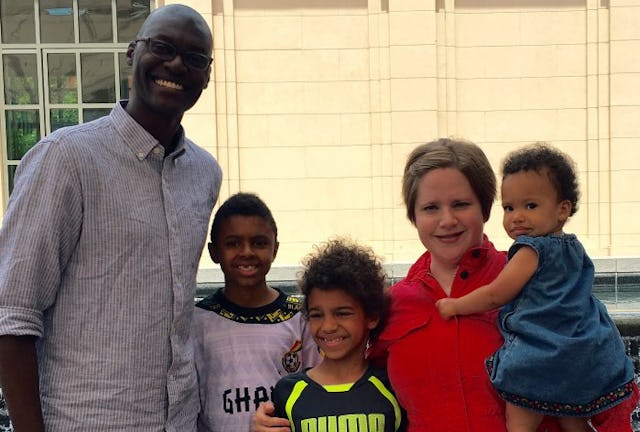My Hope For My Interracial Children

It’s been an interesting season for this country. The presidential primary has evoked more racially charged vitriol than any I remember in recent history. An Old Navy ad that features an interracial family with interracial children sparked social media comments voicing disgust at “miscegenation” and the lack of “pure breeds.” And now thinly veiled, sinister comments about Malia Obama’s acceptance to Harvard are making their way into our news feeds. Like most of America, I’ve been appalled by these developments.
But for me, it’s personal. And the feeling of shock and disappointment is not entirely new. My husband is black, I’m white, and we have three bright, feisty, biracial children—the oldest of whom will come home asking me hard questions in the very near future, I fear.
Flash back to 2008. Politics aside, we felt exhilaration that our country was on the cusp of electing a black, biracial president. My husband and I had spoken a number of times about how we didn’t think we’d live to see a black president. I remember feeling overjoyed that my son, then 18 months old, would spend his earliest formative years with a black president in office—and would be blissfully ignorant about how groundbreaking this was.
I can’t begin to scratch the surface of our nation’s complicated history with respect to race. I can only speak to my experience. The racial undertones that surfaced over the last eight years, and in particular during this year’s presidential primary, have been chilling for me. I have to tune out the news stories, because they make me fear deeply for my children.
My children are lucky to have a safe haven in their school, a small neighborhood school attended by kids with a range of skin tones, kids with two dads, and kids with two moms. Even still, home is the only truly safe space for us. When we go out, there are long looks, and sometimes questions. When I’m out without my husband, I’ve been asked if I know much about my children’s birth mom. (I have the best answer ever: YES! I know everything there is to know about their birth mom!) I understand the curiosity; people want to know how the pieces fit together. But I’m sometimes floored by the absence of a filter.
A close family friend told me once, while laughing uncomfortably, that her parents just adore my husband, but she’s not sure how to tell them their granddaughter is dating a black boy and wants to bring him over. That’s the thing that gets me. I don’t believe I’ve ever met a card-carrying member of the KKK, even though I’ve spent the bulk of my life in the South. But I do believe I’ve crossed paths with more people than I care to count who think my husband is a great guy, but would quietly be upset if their own child came home with a black boyfriend or girlfriend.
I can’t offer anything that will change the hearts and minds of people who fundamentally believe one race is inferior to any other. I believe only a small fraction of people hold this belief. But I wonder if a much larger proportion of the population, consciously or unconsciously, makes negative assumptions about families who look like mine or children who look like my children. Maybe we can find a little clarity if we pause for a moment, and picture a child.
You may see a brown-skinned boy with curly hair and make assumptions about him, his parents or home life, his behavior, or even his intelligence. But he’s just a little boy who loves Legos and Star Wars and making light sabers out of paper towel rolls. And he just happens to be at the top of his class academically. His brother, who decided he wanted to start growing an Afro a few months ago, can’t get enough of the Little House on the Prairie books and remembers every detail about Laura and Mary Ingalls’s childhood adventures. And that baby girl, with beautiful olive skin and soft brown curls? She thinks those two little boys hung the moon. She loves her dolls (she has brown ones and white ones) and also loves Thomas the Tank Engine books.
We may not agree on politics, Target’s bathroom policy, or the state of race relations in this country, but I think we can all agree there’s something innocent and magical about childhood. I hope a lot of years pass before my children know the word “miscegenation” or understand the term “half-breed.” I hope every adult they meet pauses and views them without expectation. I hope when they grow up, they live in a world that judges them first and foremost on the content of their character. I hope.
This article was originally published on